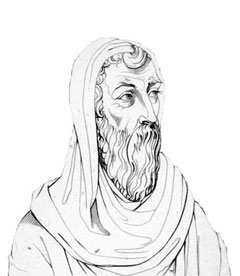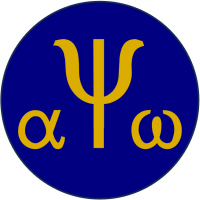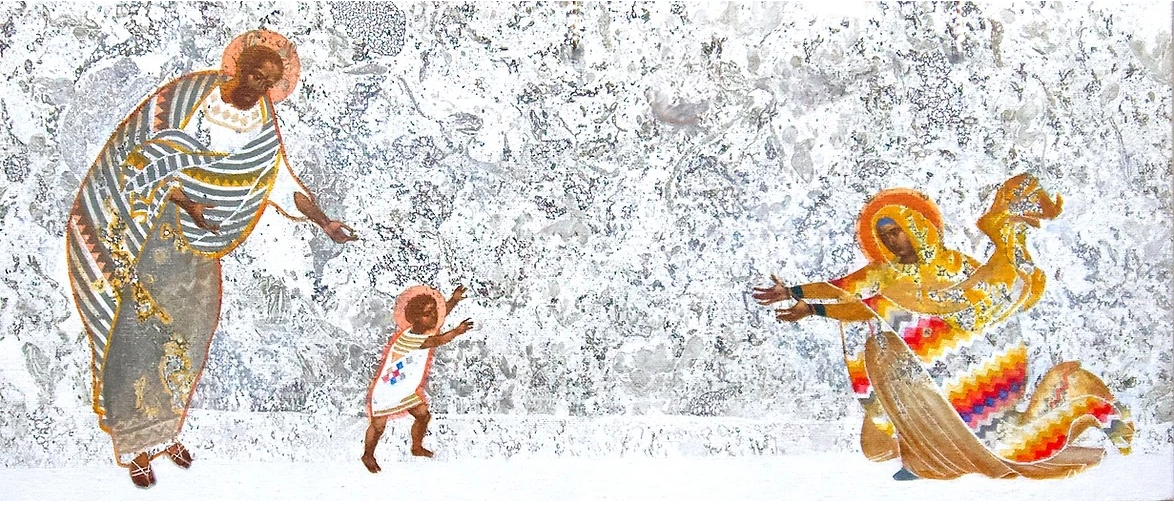
Athanasius
St Athanasius (c.295-373 AD), the “fiery bishop of Alexandria” is best known for the vital role he played in the aftermath of the landmark Church council at Nicaea in 325 AD. Over the best part of 45 years, he was a forceful and successful advocate of the creedal formula hammered out at Nicaea (which affirmed the full divinity of Christ) in the face of strong “Arian” opposition.
In the process of his campaign, Athanasius travelled widely, was exiled 5 times for his trouble, challenged emperors face to face, and lived in hiding alongside monks. During his career, he also found time to compose an inspirational treatise on the event of the Incarnation, which has been seen as a classic text ever since.
The belligerent bishop earned the nickname “Athanasius Contra Mundum” (against the world), and he can come across as a bit ranty at times. But his passion was inspired by his experience of the reality of the full divinity of God-made-man in Christ, and the implications of this event for humanity.
Quotes from Athanasius
I’ve compiled some of my favourite quotes from Athanasius on some of his common themes. Click the links to read more…
Athanasius’ Texts in Translation
Quotes and books about a person are all well and good but there’s nothing better than reading an entire text by someone to fully understand their approach.
On the Incarnation: Saint Athanasius with an Introduction by C.S. Lewis (New York: St Vladimir’s Seminary Press, 2011)
The is THE place to start! Athanasius’ classic text on the Incarnation, and used as a source of inspiration by other greats in the Early Church within a few decades (e.g. Gregory of Nyssa draws on it for his own “Catechetical Oration”). Although this text in also in the Nicene and Post-Nicene Fathers (NPNF) volume collection (see below), there are a number of different editions of the text available in more modern & readable translations.
The particular edition linked above is to the most recent, with a translation made by a leading contemporary Patristic scholar (John Behr) and also features the Greek text on the facing page (in case you can read a little Greek). Whichever edition you choose, I’d strongly recommend getting a copy which has the superb introduction by C.S. Lewis on the relevance of reading Early Church books today. Worth searching on Abebooks too.
R.C. Gregg (translator), The Life of Antony and the Letter to Marcellinus (New York: Paulist Press, 1980)
Whether Athanasius actually wrote “The Life of Antony” is still debated, but the balance of scholarly opinion would seem to be in favour of his authorship. Either way, the text is the earliest example of a new genre of Christian literature – hagiography – a deliberate attempt to portray someone as a saint. A picture is painted of Antony the monk and his ascetic pattern of life (both as a hermit and also in the role of a spiritual father overseeing monastic communities) and vivid descriptions of some of his struggles against various temptations are given.
Although this work is also in the Nicene and Post-Nicene Fathers (NPNF) volume, this translation is more modern and therefore an easier read. Listed as hard to find on Amazon, so you may want to search Abebooks as well.
L.W. Barnard (translator), The Monastic Letters of Saint Athanasius the Great (third edition) (Oxford: SLG Press, 2023)
This small booklet contains translations of six short letters which Athanasius wrote to a number of individual monks, as well as entire monastic communities, of his day. Shows another, complimentary and more pastoral, side to the bishop who is better known for his spirited defence of doctrinal issues.
The booklet is Fairacres Publication 120, and is available for a few pounds directly from SLG Press, Convent of the Incarnation, Fairacres, Oxford OX4 1TB. (Why would you not want this on your bookshelf?).
W.G. Rusch (translator/editor), The Trinitarian Controversy (Philadelphia: Fortress Press, 1980)
This book contains a selection of key texts surrounding the fourth century Trinitarian debate, by various authors. Amongst the modern translations provided is Book 1 of Athanasius’ “Orations against the Arians” (Contra Arianos) as well as other important works including three of Arius’ own letters, Gregory of Nazianzus’ “Third Theological Oration” and Gregory of Nyssa’s “On Not Three Gods”.
P. Schaff and H. Wace (editors), The Nicene and Post-Nicene Fathers of the Christian Church: Second Series, Volume 4: Athanasius: Select Works, Letters
A great “one stop shop” containing English translations of his classic texts. This volume includes, “Against the Heathen” (Contra Gentes), “On the Incarnation” (De Incarnatione), “Apology against the Arians” (Apologia Contra Arianos), “Defence of the Nicene Council” (De Decretis), “Life of Antony” (Vita Antoni), 4 books of “Orations Against the Arians” (Contra Arianos), “On the councils of Ariminum and Seleucia” (De Synodis), many letters and whole lot more.
Unfortunately, the Victorian translation sometimes makes it less easy to read than should be the case. But great value for money at approx. £10 second hand. Alternatively, view, download and print the texts for FREE! See the CCEL website.
Books about Athanasius
If you’re wanting to read more and the life and times of Athanasius, here are some recommended starting points.
K. Anatolios, Athanasius (London: Routledge, 2004)
This book has a very good introduction section on the life and times of Athanasius, followed by a selection of new translations of excerpts taken from various important texts, including his “Orations against the Arians” and “Letters to Serapion”. If you’re after just one book on Athanasius for your bookshelf, this is it.
T. D. Barnes, Athanasius and Constantius: Theology and Politics in the Constantinian Empire (Cambridge, MA: Harvard University Press, 2001)
The interaction between the Church (newly enjoying not just toleration, but also State sponsorship) and the Empire is a fascinating area of study, and Athanasius’ career, which spanned numerous emperors, an excellent vehicle for that enterprise.
The following review is from Amazon.co.uk… “Barnes focuses on Athansius’s long struggle with Constantius, who ruled the East from 337 to 361, a struggle amply documented in the works that Athanasius composed to defend himself against charges of treason and murder. Repeatedly condemned and deposed by church councils, the Bishop persistently resurfaced as a player to contend with in ecclesiastic and imperial politics.
Barnes’s work reveals that Athanasius’s writings, though a significant source for this period, are riddled with deliberate misrepresentations, which historians through the ages have uncritically accepted. Untangling longstanding misconceptions, Barnes aims to reveal the Bishop’s true role in the struggles within Christianity, and in the relations between the emperor and the church at a critical juncture.
As this book strives to demonstrate, religious policy and ecclesiastic politics were a constant and central concern to the emperors of the fourth century – despite their absence from many historical accounts.”. Seems to be hard to find on Amazon for a reasonable price, so you may want to search Abebooks as well.

